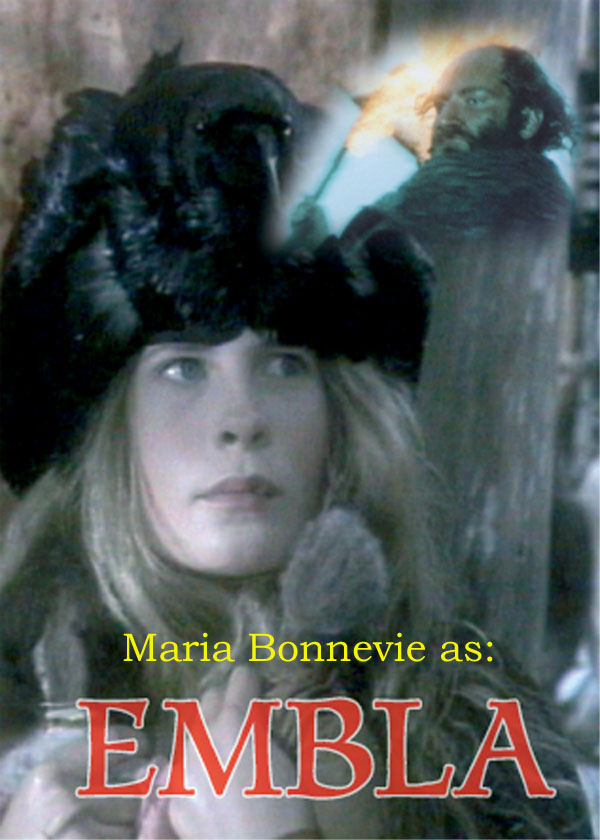
27. September to 7. October 2007
Embla, "the director's cut" version of The White Viking - will be premiered at the Reykjavik International Film Festival.
EMBLA, a new Icelandic film by Hrafn Gunnlaugsson, starring
Norwegian actress Maria Bonnevie in the lead role, will be premiered at
the Reykjavik International Film Festival on October 6th, 2007. Embla
is the "the director's cut" version of The White Viking as the
director imagined it originally. Gunnlaugsson has chosen to call the film
Embla because it centres on the fate of the heroine Embla and so that
it is not confused with The White Viking, compiled by the producers of
the film in 1992 against his wishes. Embla, stars Maria Bonnevie in her
first screen role for which she was chosen when she was only fifteen years
old.
The director has been working on the remaking of
the film for over a year in cooperation with Swedish producer Bo Jonsson
of Viking Film in Stockholm. EMBLA is the third film of the legendary
Raven Trilogy that consists of three 'Viking' films:
1. When the Raven Flies, usually known as simply The Raven (1984)
2. In the Shadow of the Raven (1987)
3. EMBLA (2007 - the director's cut of The White Viking)
In the 1984 THE RAVEN put the Icelandic film industry on the map. Set in Iceland in the Viking age, The Raven Flies has since become legendary as the most authentic Viking film ever made, and said by several critics to share many generic features with the films of Sergio Leone, Sam Peckinpah, and Akira Kurosawa.
In the RAVEN, Icelandic author and film director Hrafn Gunnlaugsson visualises the Viking Age directly from the Icelandic Sagas in a way that only an Icelander could. Followed up by the Viking film In the Shadow of the Raven, and finally now EMBLA (The White Viking) - a Viking film trilogy was born. For the first time the ancient religion of the Norse gods Odin and Thor was visualised in contrast with the new faith of Christianity brought from abroad. The Vikings called Jesus the White Christ or White Viking, who fought with his sword, the cross.
Embla is the fateful story of a young woman living in an age that saw violent clashes between the religion of old Viking gods and an increasingly militant Christianity. The narrative turns around Embla, an earl's daughter, and her struggles with the fugitive warrior king, Ólafur Tryggvason.
Ólafur Tryggvason, has returned from exile in England, fighting with the weapon of a new faith, the cross of the White Christ. Ólafur conquers lesser kings and chieftains and makes them submit to his authority. He burns down heathen temples and kills anyone who resists his regime. The ancient Viking religion of Odin is collapsing and Norway is ablaze with civil war, its earls and small kings pitched in battle against Ólafur.
Ólafur preaches one king on earth and one king in heaven and aims to rule over all the lands where the Vikings have settled. King Ólafur defeats Earl Goðbrand, Embla's father, and makes him to convert to Christianity. He then forces Askur, Embla's husband, to go to Iceland as a missionary of the White Christ while he holds Embla herself hostage in Norway. Ólafur tells Askur he will have Embla burned alive if he does not succeed in converting the Icelanders to Christianity. At the same time, King Ólafur wants Embla to become his queen and will stop at nothing to fulfil his desire.
Swedish actress Marie Bonnevie plays Embla. It was her first film role and one for which she was chosen when she was only fifteen years old. Bonnevie has since acted in over twenty films and is one of the best-known Scandinavian actresses of her generation. Her latest film is The Banishment from the Russian director, Andrei Zvyagintsev, which been nominated for a current Golden Palm Award this year in Cannes and which has attracted a great deal of interest.
The part of King Ólafur Tryggvason is played by Egill Ólafsson, one of Iceland's most experienced actors while the young Askur is played by Gottskálk Dagur Sigurðsson, whose first screen role was as a child in The Raven Flies.
Many new people have helped with the recreation of this film. Swede Bo Jonsson, who previously worked with Hrafn Gunnlaugsson on My Father's Estate (Óðal feðranna), The Raven Flies (Hrafninn flýgur) and The Sacred Mound (Hin helgu vé) was chief editing consultant on the editing. Gunnlaugsson created a new musical score together with Guðmundur Pétursson, performed by musicians from the National Symphony Orchestra of Iceland. New sound has been added by Bíóhljóð under the direction of Kjartan Kjartansson.